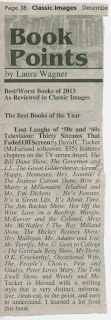Michael Ansara (1922-2013) was not only the distinctive-looking leading man of TV's Broken Arrow, but also the husband (from 1958 to 1973) of Barbara Eden. I Dream of Jeannie fans remember him for his memorable guest appearances on that show, where he played a varied lot of characters, including Hawaii's King Kamehameha, the evil Blue Djinn, and Jeannie's dashing date Biff Jellico.
Jane Connell (1925-2013) may be best known as Agnes Gooch in the Broadway smash Mame (a role she reprised in the 1974 film), but she also brightened Bewitched with her guest appearances as regal and imperious women. In various episodes, she impersonated Queen Victoria, Martha Washington, and even Mother Goose. Remember her as Hepzibah, with her free-floating device on which she tracks Darrin's demerits?
Elliott Reid (1920-2013) was a stage-trained actor who also enjoyed a busy radio career, and played Professor Shelby Ashton in Disney's The Absent-Minded Professor and its sequel, Son of Flubber. I always picture him as "Ed Warren" on I Love Lucy, the Murrow-like interviewer who finds himself refereeing a squabble between the Ricardos and the Mertzes when both couples appear on his TV show Face to Face.
Christine White (1926-2013) was the leading lady of CBS' 1961-62 sitcom Ichabod and Me, which was the subject of a chapter in my book Lost Laughs of '50s and '60s Television. Another big credit in the minds of classic TV watchers was her guest appearance in one of The Twilight Zone's best-ever episodes, "Nightmare at 20,000 Feet."
 |
| I Love Lucy: Shirley Mitchell (r.), Vivian Vance |
There are, of course, many other talented performers who left us in 2013. Which one(s) meant the most to you, and why?




































